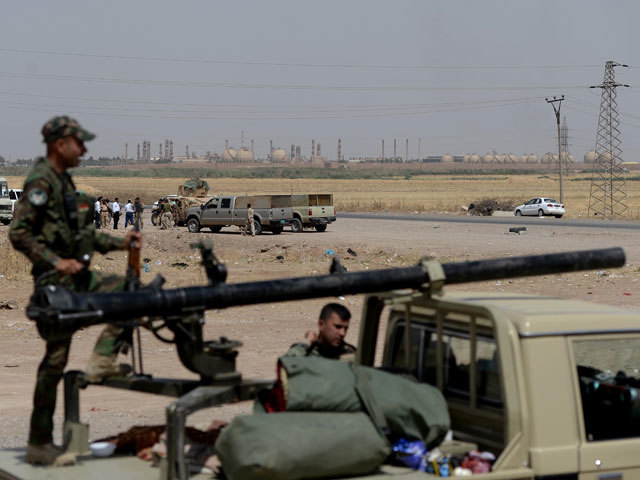
Marc Kolber, a native of Long Island, has spent more than three years overseeing the construction of offices for foreign oil companies in Iraqi Kurdistan. Now he’s joining an exodus of expatriates from the capital, Erbil.
“The expat community in Erbil was thriving, it was a very welcoming and inclusive society,” Kolber said in a telephone interview as his employer made arrangements to evacuate staff. “But now about 80 percent of expats have left.”
The Kurdistan region of Iraq has attracted hundreds of foreigners in the past five years, enticed by a mixture of oil, security and growing prosperity. The autonomous region, largely free from the violence that’s plagued the rest of the country, has some of largest untapped oil fields in the world.
Islamic State fighters are battling Kurdish troops just 50 miles (80 kilometers) from Erbil, threatening the energy boom that’s brought a thriving international airport and modern office blocks to one of the world’s most ancient cities. Oil companies including Chevron Corp. and Afren Plc have evacuated expatriate staff and halted drilling operations.
“The future of Erbil and Kurdistan as a whole is in oil, if the oil companies leave, the region will have a difficult time,” Kolber said. “Everything was built with oil money. If that dries up, there will be next to nothing left.”
The Kurdish government is grappling with a humanitarian crisis as tens of thousands flee the violence near the region’s borders. The Islamist group seized villages and Iraq’s largest dam from the Peshmerga, Kurdistan’s military force.
“Some local residents in Erbil worked themselves into a hysteria through rumors circulating on social media, causing mass panic,” said Danny Dougramachi, Erbil-based managing director of Federal Group, an Iraqi company with investments in oil and construction. “This spooked the expat community, some of whom requested their companies to get them out, and a domino effect followed with a mass evacuation.”
President Barack Obama’s military intervention — including jet strikes against Islamic State forces and humanitarian drops of supplies to refugees — has improved morale in Erbil, Dougramachi said.
“The minute Obama announced that he was considering air strikes last week, the mood changed, people were dancing in the streets and honking car horns, it was like a football victory,” he said. “Now the locals are not nervous anymore and the expats that are left are more relaxed.”
In Erbil, it’s possible to move freely, shop, eat in restaurants and mix with locals. The city has seen new shopping centers, hotels and restaurants built over the past five years.
More than 20 international oil companies have come to Kurdistan since the U.S. invasion in 2003. In contrast to the federal government in Baghdad, Massoud Barzani’s regional administration offered explorers contracts that gave them a share of oil production.
First came small companies willing to take a gamble, then giants like Exxon Mobil Corp. and Chevron followed.
This year, Barzani’s government completed an oil pipeline linking Kurdistan with Turkey, allowing them to export crude directly and bypass the oil ministry in Baghdad. Before this month’s violence, the Kurds forecast oil production would jump from 400,000 barrels a day this year to 1 million barrels a day in 2015.
Those targets may now be under threat after explorers including Afren and Hess Corp. suspended drilling as fighting flared around the city of Mosul, near Kurdistan’s border with the rest of Iraq and less then an hour’s drive from Erbil.
“One of our rigs is in the Maqlub block on top of a mountain and you can actually see Mosul in the distance,” said Randy Arnold, president of drilling services at Viking Services Ltd., an oilfield services company. “Our guys there said they saw fire and smoke in the city. We first withdrew our people back to Erbil and then we chartered a flight to fly everyone out to Istanbul.”
Marc Kolber said Erbil’s future will be determined by maintaining direct links with the rest of the world.
“If people can’t fly in and out of the region, they’ll leave,” he said. “Most international oil companies have a stomach for a little bit of unrest, but as soon as they can’t come and go anymore, they’ll pack up.”
Deutsche Lufthansa AG canceled flights to Erbil from Frankfurt, saying in a statement that “the safety of passengers and crew remains the company’s highest priority.” Emirates also suspended flights yesterday and Etihad Airways halted its route on Aug. 7.
Regional services by Turkish Airlines, Royal Jordanian Airlines, Middle East Airline and Pegasus Airlines are still flying to Erbil on schedule.
